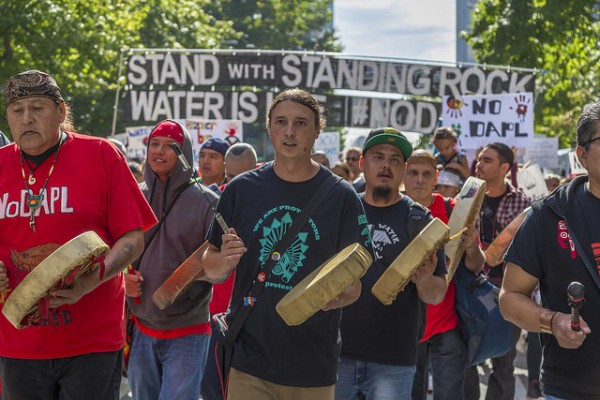
Thousands led by Native Americans from across the country have converged on rural North Dakota over the past month to stop construction of the Dakota Access pipeline near the Standing Rock Sioux reservation. Opponents say the pipeline is a threat to culturally and spiritually sacred sites as well as vital drinking water sources. Protesters have erected an encampment and are leading daily marches to the construction site demanding that the company and federal government halt construction in order to protect water and adhere to treaties with Native American tribes.
The protest over the Dakota Access pipeline reflects the social and political tensions that often emerge around resource extraction projects and potentially hazardous infrastructure, and sociologists have been at the forefront of research and analysis. Mining development led by large multinational companies often brings social dislocation, environmental problems, and a loss of livelihoods for native communities. Yet, indigenous communities have had some success in preventing development and maintaining control over land and natural resources partially through direct action, transnational coalitions, and public campaigns against corporations.
- Alex Golub. 2014. Leviathans at the Gold Mine: Creating Indigenous and Corporate Actors in Papua New Guinea. Raleigh, NC: Duke University Press.
- Gavin Hilson. 2014. Natural Resource Extraction and Indigenous Livelihoods: Development Challenges in an Era of Globalization. Farnham, GB: Routledge.
- Fabiana Li. 2015. Unearthing Conflict: Corporate Mining, Activism, and Expertise in Peru. Raleigh, NC: Duke University Press.
In the U.S., Native American reservations have often been used as sites for hazardous mining and disposal of toxic waste – what scholars call “national sacrifice zones” and environmental racism. Hooks and Smith find that Native Americans struggle with environmental injustices and are more likely to live near toxic waste sites, largely because the U.S. military has used reservations and nearby land for testing and disposing of weapons.
- Robert D. Bullard. 1994. Unequal Protection: Environmental Justice and Communities of Color. San Francisco: Sierra Club Books.
- Gregory Hooks and Chad L. Smith. 2004. “The Treadmill of Destruction: National Sacrifice Areas and Native Americans.” American Sociological Review 69(4):558–75.
- Traci Brynne Voyles. 2015. Wastelanding: Legacies of Uranium Mining in Navajo Country. Minneapolis: University of Minnesota Press.
Protest is also driven by group identities and culture. Mobilization against industrial development is shaped by historical and social differences in how people relate to the land. Indigenous philosophy, spirituality, and land claims can provide legitimacy to environmental opposition and are a source of inspiration and motivation for movement participants. This highlights the role of culture, place-based identity, and values in motivating people to participate in protest.
- William Freudenburg and Robert Gramling. 1993. “Socioenvironmental Factors and Development Policy: Understanding Opposition and Support for Offshore Oil.” Sociological Forum 8(3):341–64.
- Francesca Polletta. 1998. “‘It Was like a Fever …’ Narrative and Identity in Social Protest.” Social Problems 45(2):137–59.
- Rachel A. Wright and Hilary Schaffer Boudet. 2012. “To Act or Not to Act: Context, Capability, and Community Response to Environmental Risk.” American Journal of Sociology 118(3):728–77.
Environmentalists have joined the effort to stop the pipeline as part of a wider movement against fossil fuel extraction and climate change mobilization. Coalitions of environmentalists and indigenous peoples often develop in response to environmentally harmful projects, such as dams or pipelines, which have been important for generating public attention to issues of Native American rights while also building environmental movements. Protests over particular local industrial development can be used strategically by social movements to attract new participants and link people’s immediate concerns about health and safety to broader environmental issues.
- Mik Moore. 1998. “Coalition Building between Native American and Environmental Organizations in Opposition to Development: The Case of the New Los Padres Dam Project.” Organization & Environment 11(3):287–313.
- Joanna L. Robinson. 2013. Contested Water: The Struggle Against Water Privatization in the United States and Canada. Cambridge, MA: MIT Press.
- Kate J. Neville and Erika Weinthal. 2016. “Scaling up Site Disputes: Strategies to Redefine ‘local’ in the Fight against Fracking.” Environmental Politics 25(4):569–92.

Comments